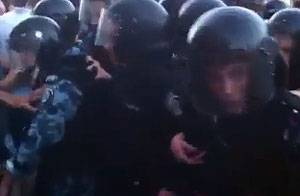“Russian” language bill pushed through

n Tuesday afternoon, with the media abuzz over the European Court of Human Rights judgement that Yury Lutsenko’s rights had been violated, the ruling majority whipped through its contentious language bill. The Law on the Principles of State Language Policy (No. 9073) has been condemned by religious and civic groups, analysts and others, as aimed at overriding the constitutional norm which states that Ukrainian is the only official State language.
The bill received 248 votes after suddenly being put to the vote by Deputy Speaker from the communists, Adam Martynyuk.
Following the vote, Lilya Hryhorovych from Our Ukraine – People’s Self-Defence said that the vote was taken in violation of the parliamentary regulations since they had used strongman tactics to vote through the bill in the version passed in its first reading.
Party of the Regions MP Yaroslav Suhkhy, commenting on such objections, said: “You won’t teach me how to vote. I was chosen by the Party of the Regions, not by you”.
The voting took place in the first minutes of the plenary session. Ukrainska Pravda reports that the “MPs from the Party of the Regions who usually take part in confrontation through force having taken position in the government’s box.”
Later they prevented MPs from the opposition from disrupting the vote.
Speaker Volodymyr Lytvyn was absent from the session. The Prime Minister Mykola Azarov arrived just before it began.
Throughout the evening there was protest with Berkut riot police out in force. Tear gas would seem to have been used, but it is unclear by whom.
While ethnic Russians are a minority in Ukraine, claims that the Russian language is a “minority” language have not convinced such bodies as the Council of Europe’s Venice Commission and OSCE and elicit profound scepticism from many Ukrainians. Russian is widely used everywhere, with Ukrainian much less common in the South and East of the country. Even in the predominantly Ukrainian-speaking West of the country it is still harder to find books in Ukrainian than in Russian. The draft law which would entail amendments to some 33 other laws would make Russian a de facto second official language in areas with a large “minority” of Russian speakers. Since there are areas where it is already hard to function in day-to-day life in Ukrainian (the Donetsk and Luhansk regions, the Crimea, for example), if the bill is passed, using Ukrainian is likely to become even harder.
Over recent months there have been a number of calls to reject this bill and stop dividing the country. Tetyana Khorunzha from the Congress of National Communities points out that no money has been set aside for if the bill is passed. “They have no intention of concerning themselves with the languages of national minorities, they plan to deal only with Russian. For that they don’t need any money. And later they’ll make it a second language”.
The Association of Jewish Organizations and Communities of Ukraine is also critical of the language draft bill. The Head of the Association, Josif Zisels does not see the bill as resolving the language problems of national minorities, and is only about trying to improve the rating of the Party of the Regions and other pro-government parties. He says that Hebrew is not under pressure in the present legislation since the Jewish communities make all effort to support the language. He adds that national minorities should have the energy to defend their own language, and does not believe this is a matter for the state.
See links below for more detail
Photo and information about the vote from Ukrainska Pravda





